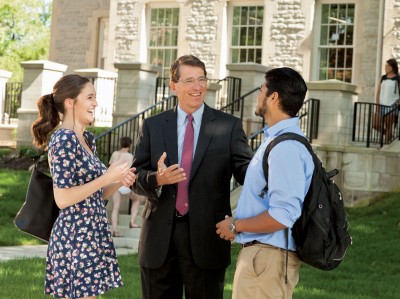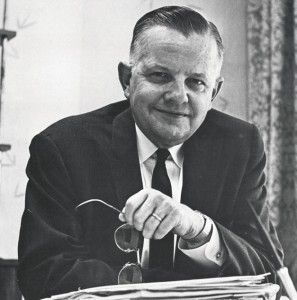Leader’s Letter
Times of Transformation in ’60s and Today
New questions challenged campuses

In May of 1968 the Commission to Study Student Life Outside of the Classroom presented its report for consideration by the Ohio Wesleyan University Faculty, Administration, and Board of Trustees. The commission, chaired by Professor Libuse L. Reed, was appointed 12 months earlier by President Elden Smith. For a year, the commission worked in nine committees to explore every aspect of co-curricular life.
I recently reviewed the full contents of this report. It is a remarkable archive of this institution’s experience of the dramatic and rapid changes that occurred on college campuses across the country half a century ago. Perhaps the most lasting legacy of the commission was the recommendation that the Board of Trustees delegate responsibility for student life policy away from a faculty committee on student life and to a newly formed Council on Student Affairs (now WCSA) with a majority of its membership coming from the student body.
The 1967-68 commission explored the topics of:
- Barn parties (They will grow legally, if permitted, illegally if not allowed.)
- Deferred rush (Early rush splits the new student’s interest and attention between orientation to academic pursuit and Greek rushing.)
- Campus dining (Recommend that dining in the new hall be coed.)
- Attractive university housing and furnishings (The current furniture situation has been described as
Early Ugly.) - Visitation policy (Despite the motives occasionally imputed to it by the adult world, the pressure for men and women visiting in each other’s rooms is probably rooted in a simple plea for privacy. How many engagements are made or broken in the public privacy of a dormitory lounge?)
- Discriminatory housing (Recommend that all entering students be required to agree in writing to accept the initial assignment of roommate without regard for race or creed.)
- Health and safety (Recommend hiring a full-time clinical psychologist to provide professional counseling.)
- Alcoholic beverages (The committee is deeply sensitive to the fact that no more emotionally charged issue is before the University community than the issue of liquor use by students.)
- And more.
I often hear alumni who were students in the late ’60s talk about the dramatic transformation that occurred in the campus culture between the time of their matriculation and the time of their graduation. The lengthy and comprehensive report of the Commission to Study Life Outside of the Classroom serves as a reminder that this transformation did not happen in a vacuum, nor did it happen without deep and careful reflection. While in places the language seems quaint to our 21st-century minds, the report addressed questions largely unasked prior to that time.
I am grateful for the academy’s commitment to civil discourse in which those who disagree vehemently agree to listen to one another.
President, Ohio Wesleyan University
Since the founding of the first European institutions of higher learning nearly a millennium ago, the university campus has been a focal point for examination of and at times confrontation with the most pressing issues of the time. Half a century ago those issues included a growing awareness of the insidious impact of racial discrimination, gender inequity, economic disparity, and international warfare. A generation was maturing in a time when technology, mass communication, advances in health care, and an emerging popular culture coincided with calls for freedom of expression and self-determination, new tastes in music, and an entirely new sense of fashion.
Some saw this as a threat to the fundamental values that shape our society. Others saw it as the coming of age of a people that sought to claim for every member of society, not just those privileged by race, gender, or economic station, the inalienable rights of life, liberty, and the pursuit of happiness.
There is a sense in which history is repeating itself half a century later.

Campuses across the country are being challenged to think deeply and critically about the experiences of those who in one way or another may be marginalized in our society. Some are concerned that universities are losing their sense of true purpose. And in some cases, demands of students may cross that line. But on the whole, the issues attracting media attention on campuses today (the experience of people of color, sexual assault, the LGBTQ community, student debt and the loss of opportunity as a result of college cost, the exaggerated influence of big-time athletics in Division I, to name just a few) are reflections of tensions that exist throughout our society and that cry out for careful examination and critical thought.
I, for one, am grateful for the historic commitment of the American academy to foster an environment where the free and open exchange of ideas, even those we may find most offensive, is protected as a virtue not to be compromised. I am grateful for the academy’s commitment to civil discourse in which those who disagree vehemently agree to listen to one another and where questions can be asked about our social structure and our commitment to equity and justice.
At times, these commitments lead me to a position of great discomfort. Sometimes the discomfort results from a challenge to my own position and the recognition that the challenge has a point worthy of my consideration and perhaps even worthy of the changing of my mind. Sometimes the discomfort comes because I know the position being advocated has no merit and perhaps no basis in historical fact.
The discomfort of that moment is the price of a free and open conversation. But it is precisely that conversation that in the end creates the opportunity for a more humane world, provided others respond appropriately.
In this issue of OWU Magazine, we reflect on that time of extraordinary change half a century ago. Whether you have the years that give you firsthand memory of that time or you are sufficiently young to know this only as a chapter of history, I encourage you to reflect on the idealism that captured that generation and that led to such dramatic change. And I encourage you to consider the ways in which today’s students reflect a similar idealism as they seek to make the world a better place.
I welcome your thoughts in response.
![]()
Rock Jones
President, Ohio Wesleyan University
Twitter: @owu_rockjones
